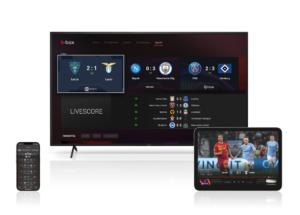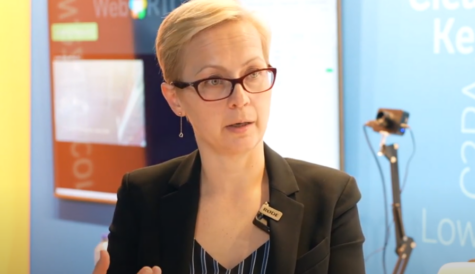
After more than 40 years of operation, DTVE is closing its doors and our website will no longer be updated daily. Thank you for all of your support.
MediaHub: building a next-generation OTT TV service
 While cord-cutting and the growth in consumption of OTT and social video has cast a shadow over the value of pay TV, network operators clearly still value video services as a way to cement subscriber loyalty and differentiate their offerings.
While cord-cutting and the growth in consumption of OTT and social video has cast a shadow over the value of pay TV, network operators clearly still value video services as a way to cement subscriber loyalty and differentiate their offerings.
However, given competition for consumers’ attention from OTT streaming giants, it has become more important than ever for those TV services to be reliable, personalised and to provide a high-quality experience.
Even for big, well-resourced operators, this can be quite a task. For second and third-tier operators, delivering a compelling offering is highly challenging.
“The biggest challenge for those operators is the market transformation that has been driven by the aggressive entrance of global players into the market,” says Borislav Bozhilov, CEO of Bulgaria-based video technology company MediaHub, provider of advanced IPTV and OTT streaming solution TimeView.
“Subscribers expect a service that covers their basic needs from their TV operators, and one that enables them to have control over their content, and to have access to that content everywhere, on every device.”
Operators are therefore looking to launch advanced services or upgrade existing offerings to the next level to deliver value to consumers.
“This is where we come in,” says Bozhilov. “We strive to provide operators with a platform that can unlock this new level of technology to them and meet the heightened demands of end consumers in today’s market.”
Key features
What then are the key features that a compelling TV offering needs to include?
“Content is first. Then you have interactivity, which means transferring control of the service from the operator to the end user, whether he is viewing it through a mobile or a TV,” says Bozhilov.
To make all this work, the service must be powered by rich metadata that can take users to the content they want in any given context.
Providing rich functionality and personalisation of content discovery takes engineering effort and resources. Operators have a choice of trying to piece together the puzzle themselves or going with a single supplier.
For those opting to build their own TV platform, there are some potential advantages and significant challenges.
“There are some advantages to a multi-vendor approach,” says Bozhilov. “The biggest probably is having the flexibility to choose between different vendors to supply the different parts of the platform and the ability to remove one element and replace it with another solution. However, there is a price. There is an extreme level of complexity in terms of product development and coordinating between the different vendors. That can make this a slow process at a time when the market shows very clearly that operators don’t have much time to react to the giants.”
Another factor to add to this is the challenge of maintaining and developing platforms that have been supplied by multiple vendors.
By contrast, says Bozhilov, relying on a single supplier gives “clear responsibility for the ownership of the platform and for all the decision that are taken, and for the product roadmap”.
A single supplier means that platform development is highly coordinated and based on a single vision of how the platform should evolve. There is no additional or unforeseen cost in making different parts of the platform work with the other parts.
Relying on a single supplier does not mean that operators will struggle to shape and differentiate their service, because suppliers such as MediaHub are able to deliver high levels of customization.
“We don’t provide a basic solution that everybody uses. Obviously, that is not what operators want. Every company wants to have a unique offering for their customers and that is something that we can do,” says Dimitar Dimov, head of product at MediaHub.
Another MediaHub executive, Vladislav Georgiev, the company’s marketing chief, points out that there are additional risks associated with a multi-vendor approach that operators should take into account.
“A multi-vendor solution means that your platform will be as good as the worst vendor in the solution. If you opt for the four or five best of the best in the world to avoid this, the solution is likely to be very, very expensive. And for small and mid-sized operators it may be impossible to align with the big players’ roadmaps.”
Georgiev says that those opting to partner with MediaHub will not be required to rely on heavy investment in hardware and can rely on the company to provide an end-to-end service. MediaHub’s key case study is Bulgarian operator Bulsatcom, for which MediaHub is effectively providing TV-as-a-service with a clear roadmap for future development, freeing the operator up to focus on marketing and customer service.
Sports module
MediaHub is now looking to take the expertise it has developed in Bulgaria to the international market, with a presence at the forthcoming IBC to launch it to the wider TV operator community.
A key focus at the show will be the company’s sports module.
Live streaming and live sport is a key element of a complete TV offering and one that is increasingly looked to as a way to differentiate a service. But delivering a reliable live sports offering is challenging.
“There are two aspects to this,” says Bozhilov. “The first main challenge for operators is to secure the rights they need. But to unlock the value of those rights to the full, the biggest challenge is to provide real-time metadata. Sport is huge in terms of viewership and most people watch it in real time. They need the most accurate and up-to-date metadata associated with what they are seeing on the screen.”
Users interact with live sports increasingly via their phones and other devices, searching for relevant additional information about the event.
“With our solution, every single piece of information that is important is now available in front of the viewers’ eyes on the TV, so there is no longer a need to do this,” says Dimov.
In addition to real-time statistics, MediaHub’s sports solution also enables users to track down the event they want to watch quickly in an increasingly fragmented distribution ecosystem.
“Nowadays there are so many sports channels that viewers often don’t know which game is being played on which channel and must search sports websites and so on to find out where to watch the game. We can overcome this problem by providing all the necessary information on the screen,“ says Dimov.
“For every game that is going to be aired, users can also receive real-time notifications about what is happening. If there is a major event such as a goal, red card or penalty given, the need never miss that. We can also provide additional value by enabling users to receive more information about favourite teams, leagues, players and coaches – such as a notification about when their favourite players is going to be in his next game or what is happening with their favourite team.”
MediaHub’s sports module is currently being deployed by anchor customer Bulsatcom, with a full launch planned by the end of this year. For the international market the sports module will be offered on either a standalone basis (which could be targeted for example at sports leagues looking to establish their own direct-to-consumer service) or as part of the end-to-end platform. Development of the Sports module is a result of a strategic partnership with Media-Press and Enetpulse.
Showcase of capabilities
MediaHub’s experience of working with Bulsatcom will also serve as a broader showcase of its capabilities in the international market. The technology company started working with the Bulgarian operator at a time when the latter was seeing its satellite TV user base decline and service offering contract.
Turning to MediaHub to oversee the deployment of a more modern IP-based TV platform, the operator’s b.box solution rapidly helped reverse its decline and the user base began once more to increase, and the operator now has a base of over 600,000 customers, deploying a service with multiple advanced functionalities over Google-certified Android TV boxes, Smart TV apps and mobile apps.
MediaHub now plans to highlight this success story and its wider capabilities at the upcoming IBC show in Amsterdam.
“Our platform is a software solution that can be adapted easily and is light on resource requirements. It is highly stable. Most of our applications are native or near-native. We can highlight the unique properties of every device on which the TV service is present We want to showcase this new way of presenting TV,” says Georgiev.
Diimov adds that having validated the technology and business model over several years working closely with Bulsatcom, MediaHub is now the TV technology leader in the Bulgarian market. In addition to TV operators such as Bulsatcom, MediaHub is also working with broadcasters. The company can provide TV-as-an-app within common Smart TV ecosystems including Android and Tizen, or provide a TV offering using dedicated external hardware.
“Going international now is just a natural move for us,” he says.
This is sponsored content.



